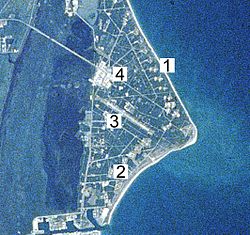CCAFS
| Cape Canaveral Air Force Station | |
|---|---|
| Part of Patrick Air Force Base | |
| Cape Canaveral, Florida, United States Near Cocoa Beach in United States |
|
 |
|
 |
|
| Coordinates | 28°29′20″N 80°34′40″W / 28.48889°N 80.57778°W |
| Type | Air Force Base |
| Area | 1,325 acres (5 km2) |
| Site information | |
| Owner | U.S. Department of Defense |
| Operator | Air Force Space Command |
| Controlled by | 45th Space Wing |
| Open to the public |
No |
| Website | http://www.patrick.af.mil |
| Site history | |
| Built | 1940 |
| In use | 1948—present |
| Events | Space Race |
| Location | Cape Canaveral, Florida, United States |
|---|---|
| Coordinates | 28°29′20″N 80°34′40″W / 28.48889°N 80.57778°WCoordinates: 28°29′20″N 80°34′40″W / 28.48889°N 80.57778°W |
| Area | 1,325 acres (5 km2) |
| Built | 1950+ |
| Visitation | Not open to the public |
| NRHP Reference # | 84003872 |
| Significant dates | |
| Added to NRHP | April 16, 1984 |
| Designated NHLD | April 16, 1984 |
Cape Canaveral Air Force Station (CCAFS) (known as Cape Kennedy Air Force Station from 1963 to 1973) is an installation of the United States Air Force Space Command's 45th Space Wing, headquartered at nearby Patrick Air Force Base. Located on Cape Canaveral in Brevard County, Florida, CCAFS is the primary launch head of America's Eastern Range with three launch pads currently active (Space Launch Complexes 37B, 40, and 41). Popularly known as "Cape Kennedy" from 1963 to 1973, and as "Cape Canaveral" from 1949 to 1963 and from 1973 to the present, the facility is south-southeast of NASA's Kennedy Space Center on adjacent Merritt Island, with the two linked by bridges and causeways. The Cape Canaveral Air Force Station Skid Strip provides a 10,000-foot (3,000 m) runway close to the launch complexes for military airlift aircraft delivering heavy and outsized payloads to the Cape.
A number of American space exploration "firsts" were launched from CCAFS, including the first U.S. Earth satellite (1958), first U.S. astronaut (1961), first U.S. astronaut in orbit (1962), first two-man U.S. spacecraft (1965), first U.S. unmanned lunar landing (1966), and first three-man U.S. spacecraft (1968). It was also the launch site for all of the first spacecraft to (separately) fly past each of the planets in the Solar System (1962–1977), the first spacecraft to orbit Mars (1971) and roam its surface (1996), the first American spacecraft to orbit and land on Venus (1978), the first spacecraft to orbit Saturn (2004), and to orbit Mercury (2011), and the first spacecraft to leave the Solar System (1977).
...
Wikipedia




